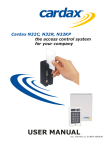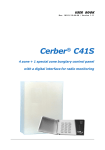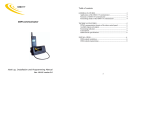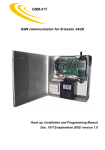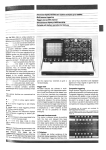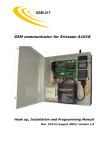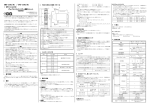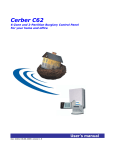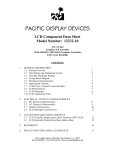Download INSTALLATION MANUAL
Transcript
Cardax N32R Network Interface for Access Control System INSTALLATION MANUAL Doc. 20106/03.06/Versiunea F Contents 1 2 INTRODUCTION ................................................................................................................................................ 3 CARDAX N32R ................................................................................................................................................... 4 2.1 NETWORK INTERFACE MODULE BOARD ................................................................................................... 5 2.2 RESOURCES ............................................................................................................................................... 5 3 CONNECTIONS .................................................................................................................................................. 5 3.1 POWER SUPPLY.......................................................................................................................................... 5 3.2 INPUTS and OUTPUTS ............................................................................................................................... 6 3.2.1 Wiring a NC Lock Device..................................................................................................................... 6 3.2.2 Wiring a NO Lock Device .................................................................................................................... 7 3.2.3 Details regarding the four relay outputs on the network interface module CARDAX N32R ............... 7 3.2.4 Wiring magnetic sensor and request to exit button ........................................................................... 8 3.3 CARD READER INTERFACE ........................................................................................................................ 8 3.4 COMMUNICATION.................................................................................................................................... 10 3.4.1 Wiring the module Cardax N32R to the serial bus RS485 ................................................................ 10 4 BOARD SETTINGS ........................................................................................................................................... 11 4.1 JUMPERS .................................................................................................................................................. 11 4.1.1 Description ........................................................................................................................................ 11 4.2 DIP-SWITCHES......................................................................................................................................... 11 4.2.1 Description ........................................................................................................................................ 11 4.3 LEDS FOR STATUS NOTIFICATION.......................................................................................................... 12 Table list Table Table Table Table Table 3-1: 3-2: 3-3: 3-4: 4-1: Power supply signals............................................................................................................................... 5 I/O signals............................................................................................................................................... 6 Card reader interface signals .................................................................................................................. 8 Communication interface signals .......................................................................................................... 10 Jumper functions................................................................................................................................... 11 Figure list Figure Figure Figure Figure Figure Figure Figure Figure Figure Figure Figure 2.1 2.2 3.1 3.2 3.3 3.4 3.5 3.6 3.7 3.8 3.9 Cardax N32R ........................................................................................................................................... 4 Schematic view of the network interface module board N32R ............................................................... 5 Power supply signals ............................................................................................................................... 5 I/O signals ............................................................................................................................................... 6 Wiring NC lock device.............................................................................................................................. 7 Wiring NO lock device ............................................................................................................................. 7 Wiring magnetic sensor and request to exit button................................................................................ 8 Card reader interface signals .................................................................................................................. 8 Communication interface signals........................................................................................................... 10 Wiring the network interface module to the serial bus RS485.............................................................. 10 Connecting the control access module Cardax on the RS485 serial bus .............................................. 10 2 1 INTRODUCTION Terms Central Unit: Defines equipment able to communicate to up to 32 network interface modules. It stores the system database and the card codes in the system. The central unit for CARDAX system is represented by the Cardax N32C module. Network Interface: Defines the equipment able to control and monitor an access point on the basis of decisions communicated by the central unit. In Cardax system the network interface modules are Cardax N32R and Cardax N32KP. As a detail, the central unit PCB of Cardax N32C incorporates the functions of a Cardax N32R module. RIM – Reader Interface Module: Interface with the card reader, defining equipment able to translate the signals from the card (code) reader. In Cardax system such interfaces are present on the central unit Cardax N32C and on each Cardax N32R network interface module as well. Access Point: It’s a zone allowing access in a supervised area. Each access point is controlled by a network interface module. PC – Personal Computer: The monitoring software, the set up software and the presence software as well run on the PC. Data received by the central unit Cardax N32C are sent to PC as events. On the basis of these events, there can be generated reports and presence files. A generic view of CARDAX system is shown in figure1.1: ACCESS CONTROL SYSTEM CARDAX RS-485 Cardax N32C Cardax N32R Cardax N32KP Figure 1.1 Generic view of CARDAX control access system In the picture above you can see the main elements of CARDAX Access Control system. A. Cardax N32C is the system central unit. Functions: - keeping the system data base (users, access zones, schedules, type of readers); - granting/denying access into the supervised access points upon set up criteria (zones, schedules, validity code period, antipassback, etc.); - keeping the event log; - communication with the network interface modules in the access points (RS485 serial interface); 3 - communication with the PC (RS232 serial interface). B. Cardax N32R is a network interface module that can assume two magnetic or proximity card readers to work with. The module controls a single access point in both directions (entry/exit). On demand, an request to exit button could be used in addition to the card readers. C. Cardax N32KP is a network interface module that accepts keypad codes. As opposed to Cardax N32C and Cardax N32R, it does not incorporate a stabilized 12V power supply. The module controls a single one-way access point. To control the access point in both directions, two such modules will be mounted at same access point. The functions of Cardax N32R or Cardax N32KP network interface modules are: - Detection of access point status (door, turnstile, etc.) by means of a magnetic sensor (or any N.O. contact); - Detection of request to exit button trigger (if necessary); - Managing the lock device; - Communication with central unit Cardax N32C; - Reading the access code from card readers or keypads; - Relay triggering upon events issued at the access point (Forced Door, Door propped, etc.). 2 CARDAX N32R Please, verify if your package contains: - Metallic box - Network interface module - 14V / 3A transformer - fuse base - 250mA fuse Figure 2.1 Cardax N32R The installation procedure has two steps: 1. Physical connection of the electric cables. 2. Network interface module configuration by means of jumpers and switchers. 1. Cable connection: There are four signal groups: A. Power supply B. Card reader interface C. Input/Output signals for the access point interface i. Door sensor ii. Request to exit button iii. Lock device iv. Optic-acoustic alert in case of different events D. Serial communication interface RS485 Cables: 1. For power supply connection (220Vac) – 3-wire cable: 1 – 1.5mmp 2. Card reader cable: cable 0.22mmp + shield (8 wires). The shield should be connected to GND. 3. Request to exit button and door sensor: 0.22mmp cable 4. Lock device: cable 0.5 – 0.7mmp 5. RS485 serial interface: 4-wire twisted pair + shield or UTP cable, category 5 shielded. 2. Network interface module configuration The following parameters could be hardware programmed: A. The address of card reader interface 4 B. RS 485 end of line resistor. C. Card readers’ power supply + 2.1 NETWORK INTERFACE MODULE BOARD + + + 3 12V 5V 1 12V 5V 1 3 + + + Figure 2.2 Schematic view of the network interface module board N32R 2.2 RESOURCES - 4 relay outputs to trigger the lock device and various notifications; request to exit button input; magnetic door sensor input; 12V / 1.5A lock device power supply; RS 485 serial interface for central unit communication; Monitoring and diagnosis LEDs. 3 CONNECTIONS 3.1 POWER SUPPLY PLUS MINUS ~ ~ GND 12V N1 N2 G S COM DS RE NO C NC NO C NC NO C NC NO C NC 2A 3A LED BP _ + 2B 3B LED BP _ + Figure 3.1 Power supply terminals Table 3-1: Power supply signals PIN NUMBER 1 2 3 4 5 NAME ~ 14V (1) ~ 14V (2) GND +12V FUNCTION 14V AC SUPPLY EARTH GROUND 14V AC SUPPLY GROUND DC POWER SUPPLY REMARKS Connectors for lock device power supply. Order of connections: - Red wire (+) to “+” plug of the battery. - Black wire (-) to “–” plug of the battery. RED power led should light. 5 - Transformer wires should be connected to “~” connectors. The RED power led will be off while the YELLOW led will light. The connector in the middle of “~” connectors will be grounded together with the metallic case. Please, verify the voltage between 12V and GND connectors is about 13.6 volts. This value indicates a voltage high enough for charging the battery. If necessary, adjust this value by means of the potentiometer located on the left upper side of the board. NOTE: If AC power is applied before connecting the battery, the RED led will not turn on when battery power is applied. 3.2 INPUTS and OUTPUTS PLUS MINUS ~ ~ GND 12V N1 N2 G S COM DS RE NO C NC NO C NC NO C NC NO C NC 2A 3A LED BP _ + 2B 3B LED BP _ + Figure 3.2 I/O signals Table 3-2: I/O signals PIN NUMBER NAME FUNCTION Common for door sensor and request to exit button 9 COM 10 DS DOOR SENSOR input 11 RE REQUEST TO EXIT BUTTON input (REQUEST EXIT) 12 13 14 15 16 17 18 19 20 21 22 23 NO C NC NO C NC NO C NC NO C NC ADDITIONAL REMARKS Internally wired at 12V, not to GND The sensor or any other NC contact is connected between DS and COM The button or any other NO contact is connected between RE and COM EXTERNAL SIGNALS OF 12V/10A MAIN RELAY Main relay, triggers the lock device EXTERNAL SIGNALS OF SECONDARY RELAY 1 12V/1A Relay output destined to Forced door event EXTERNAL SIGNALS OF SECONDARY RELAY 2 12V/1A Relay output destined to Propped door event EXTERNAL SIGNALS OF SECONDARY RELAY 3 12V/1A Relay output destined to inhibit other sensors during the access process 3.2.1 Wiring a NC Lock Device NC Lock devices are normally activated (powered). Their power supply should be cut to release the access during the access time. These devices current consumption is under 1A. When power supply fails, the access point is released. 6 ~ ~ GND 12V N1 N2 GS COM DS RE NO C NC NO C NC NO C NC NO C NC 2A 3A LED BP _ + 2B 3B LED BP _ + NORMALLY CLOSED ELECTROMAGNETIC LOCK Figure 3.3 Wiring NC lock device 3.2.2 Wiring a NO Lock Device NO Lock devices are normally deactivated (not powered). Their power supply should be connected to release the access during the access time. Sometimes the device is triggered with train of impulses. These devices’ current consumption could exceed 2-3A but only for a while. When power supply fails, the access point is locked. ~ ~ GND 12V N1 N2 GS COM DS RE NO C NC NO C NC NO C NC NO C NC 2A 3A LED BP _ + 2B 3B LED BP _ + NORMALLY OPEN ELECTROMAGNETIC LOCK Figure 3.4 Wiring NO lock device Note: The diode is 1N4001 or equivalent. 3.2.3 Details regarding the four relay outputs on the network interface module CARDAX N32R 1. MAIN RELAY (12V/10A) is destined, generally speaking, to the lock device (or for turnstile command, etc.). The type of the lock device (N.O. or N.C. electromagnetic locks, turnstiles, etc.) assumes a specific relay period to be programmed. The Main Relay time could be programmed through the PC. If this time has value 0, then the relay will be triggered with two short impulses. The main relays commutes on a valid access command (valid card or request to exit button push) and releases when the relay time expires or if the door sensors sees “door opened” and then “door closed” during this period of time. The default main relay time is 5 seconds. 2. SECONDARY RELAY 2 (“FORCED DOOR” - 12V/1A). This relay commutes when Forced Door event occurs. After detecting the door being opened (by means of a magnetic sensor) without authorization (without a valid card code or without pressing the request to exit button), the relay will commute for a predefined time of 20 seconds. The relay releases before the time expired if a valid code (card) is entered. The relay could be connected to a burglary control panel or to a siren powered from the N32R power supply (siren consumption < 300mA) or from an external power supply. 7 The relay is usually connected to a 24-hour zone of a burglary control panel. 3. SECONDARY RELAY 3 (“DOOR LEFT OPEN” - 12V/1A). This relay commutes when Door Left Open event occurs. The event is generated when the door sensor detects “door open” even after the access time (entry/exit time) expired. The relay releases only when the sensor detects “door closed”. The relay can be connected to a burglary control panel, to an acoustic device (buzzer) or optic device (flash, LED). The relay is usually connected to a “chime zone” of a burglary system. 4. SECONDARY RELAY 4 (“INHIBIT” - 12V/10A). The relay is activated together with the main relay and releases upon door closing following a valid access process. The relay could be used to short (inhibit) a sensor of a burglary control panel during the access time. Warning: do not use the same relay for both the burglary control panel and the access control system. Note: When 2-way turnstiles with separate triggering on each way are used, this relay can be programmed to function as the main really. The main relay actions for one way, while the „INHIBIT” relay actions for the other. To work this way, the module Cardax N32R should be equipped with other firmware version purchased only on special request. 3.2.4 Wiring magnetic sensor and request to exit button ~ ~ GND 12V N1 N2 GS COM DS RE NO C NC NO C NC NO C NC NO C NC 2A 3A LED BP _ + 2B 3B LED BP _ + RTE Figure 3.5 Wiring magnetic sensor and request to exit button Note: The magnetic sensor could be replaced by any NORMALLY CLOSED device. The request to exit button could be replaced with any NORMALLY OPEN device. Attention: COM pin is internally connected to 12V, not to GND. 3.3 CARD READER INTERFACE ~ ~ GND 12V N1 N2 G S COM DS RE NO C NC NO C NC NO C NC NO C NC 2A 3A LED BP _ + 2B 3B LED BP _ + Figure 3.6 Card reader interface signals Table 3-3: Card reader interface signals For the communication standard ISO TRACK 2 (usually used by magnetic card readers): PIN NUMBER 24 25 26 27 28 29 30 31 32 33 34 35 NAME 2A 3A LED BP + 2B 3B LED BP + – FUNCTION STROBE IN reader NDATA IN reader LED control IN reader Beeper control IN reader 5/12V power supply IN reader GND power supply IN reader STROBE OUT reader NDATA OUT reader LED control OUT reader Beeper control OUT reader 5/12V power supply OUT reader GND power supply OUT reader REMARKS If readers allow that If readers allow that Power supply is configured by means of JP4 If readers allow that If readers allow that Power supply is configured by means of JP5 8 For the communication standard WIEGAND (usually used by proximity card readers): PIN NUMBER 24 25 26 27 28 29 30 31 32 33 34 35 NAME 2A 3A LED BP + 2B 3B LED BP + – FUNCTION DATA1 IN reader DATA0 IN reader LED control IN reader Beeper control IN reader 5/12V power supply IN reader GND power supply IN reader STROBE/DATA1 OUT reader NDATA/DATA0 OUT reader LED control OUT reader Beeper control OUT reader 5/12V power supply OUT reader GND power supply OUT reader REMARKS If readers allow that If readers allow that Power supply is configured by means of JP4 If readers allow that If readers allow that Power supply is configured by means of JP5 The device may interface both ISO TRACK 2 and WIEGAND readers. IN THE First case, the signals to communicate the card code are STROBE and NDATA, in the second case the signals are DATA1 and DATA0. If two readers are connected to the module Cardax N32R, they should be of the same type. If the reader has no LED and/or BEEP controllable signals, then EXTERNAL LEDs or buzzers could be attached. LED and BP are open collector NPN outputs at the voltage configured on JP4 and JP5. When an EXTERNAL LED/BUZZER is used, then: - LED cathode is wired to “LED” signal. - LED anode should be connected to “+” terminal through 470 ohm resistor if the reader is 5V supplied or 1.2K if the reader is powered 12V. - “–” pin of the beeper is wired to “BP”. - “+” pin of the beeper should be connected to “+” terminal through 470 ohms resistor if the reader is 5V supplied or 1.2K if the reader is powered 12V. Notes: The readers’ power supply is programmed by means of JP4 and JP5 (see section 4.1). When two readers are mounted on the same access point, then by default the terminals 2A and 3A correspond to the ENTRY reader, and the terminals 2B and 3B correspond to the EXIT reader. This configuration could be inverted with an option of the access control software. Distance limits in between the readers: 1. Magnetic readers do not generate distance problems. They may be mounted as near as you wish. 2. The proximity readers are of two types: with amplitude modulation and with frequency modulation. 3. The frequency modulation ones do not generate problems regarding distance between them. The amplitude modulation ones should be tested before being mounted as regards to the minimum distance between them. The readers should be powered and placed at different distances from one another. Notice how they influence each other. If the distance is too small, then the readers either do not “see” the card at all, or they read the card from a very small distance. Another factor that influences the reading distance is the mounting surface. As for the proximity readers, the metal mounting surfaces reduce substantially the reading distance. If you cannot avoid metallic surfaces, then place a piece of plastic (10 mm thick) between the reader and metal. 9 3.4 COMMUNICATION ~ ~ GND 12V N1 N2 G S COM DS RE NO C NC NO C NC NO C NC NO C NC 2A 3A LED BP _ + 2B 3B LED BP _ + Figure 3.7 Communication interface signals Table 3-4: Communication interface signals PIN NUMBER NAME 6 N1 7 N2 8 GS FUNCTION RS485 serial bus REMARKS Wired to N1 pin of the next equipment on the bus Wired to N2 pin of the next equipment on the bus Wired to GS pin of the next equipment on the bus*** *** GS pin is used when the distance between equipments is long. The signal equalizes the potentials on the RS485 bus between the two equipments. 3.4.1 Wiring the module Cardax N32R to the serial bus RS485 ~ ~ GND 12V N1 N2 GS COM DS RE NO C NC NO C NC NO C NC NO C NC 2A 3A LED BP _ + 2B 3B LED BP _ + SERIAL BUS RS 485 Figure 3.8 Wiring the network interface module to the serial bus RS485 Notes: 1. The maximum distance between the connector and the RS485 bus is 8 cm long to prevent possible reflections 2. If the network interface module is at one end of the serial bus then the jumpers JP3 and JP4 should be closed 3. The cable should be RS485 type (120 ohm impedance) or at least FTP type (100 ohm impedance, shielded – foil) 3. If the cable is shielded laced, the shield lace will be connected at the GND signal at one end of the serial bus. The connection of several modules on the RS485 bus is shown in the figure below. The jumpers should be closed on the bus ends (red colored). 12V GND GS N1 N2 GS N1 N2 GS N1 N2 GS N1 N2 SHIELD Figure 3.9 Connecting the control access module Cardax on the RS485 serial bus - 10 4 BOARD SETTINGS 4.1 JUMPERS The board JUMPERS have the following functions: Table 4-1: Jumper functions NAME JP1 JP2, 3 JP4, 5 RESOURCE CONTROL Board reset RS485 end of line Control for card reader power supply FACTORY POSITION OPEN OPEN CLOSE 1-2 (12V) 4.1.1 Description JP1 (RESET) Press this pushbutton for one second if the system blocks for any reason. JP2 and JP3 When closed, these jumpers control the RS485 signal protection. Short circuit these jumpers if Cardax N32R module is at one end of the bus. JP4 and JP5 They select magnetic or proximity card reader power supply. In 1-2 closed position, the power supply is 12Vdc. In 2-3 closed position, the power supply is 5Vdc. 4.2 DIP-SWITCHES SW1 establishes the address of the card reader interface. 4.2.1 Description SW1 This 8 position DIPSWITCH is used to establish the address of the card reader interface. To set this address, you have to follow this procedure: - Set the board address according to the table 4-2; - Put SW1.1 ON - Put SW1.2 ON - Push the RESET button for 5 seconds - Put SW1.1 OFF - Put SW1.2 OFF - At this moment, the activation of the newly configured network interface module can be noticed on the PC installed access control software. Table 4-2: RIM address ADDRESS 4 00 OFF 01 OFF 02 OFF 03 OFF 04 OFF 05 OFF 06 OFF 07 OFF 08 OFF 09 OFF 10 OFF 11 OFF 12 OFF 13 OFF 14 OFF 15 OFF configuration 5 6 7 OFF OFF OFF OFF OFF OFF OFF OFF ON OFF OFF ON OFF ON OFF OFF ON OFF OFF ON ON OFF ON ON ON OFF OFF ON OFF OFF ON OFF ON ON OFF ON ON ON OFF ON ON OFF ON ON ON ON ON ON 8 OFF ON OFF ON OFF ON OFF ON OFF ON OFF ON OFF ON OFF ON ADDRESS 16 17 18 19 20 21 22 23 24 25 26 27 28 29 30 31 4 ON ON ON ON ON ON ON ON ON ON ON ON ON ON ON ON 5 OFF OFF OFF OFF OFF OFF OFF OFF ON ON ON ON ON ON ON ON 6 OFF OFF OFF OFF ON ON ON ON OFF OFF OFF OFF ON ON ON ON 7 OFF OFF ON ON OFF OFF ON ON OFF OFF ON ON OFF OFF ON ON 8 OFF ON OFF ON OFF ON OFF ON OFF ON OFF ON OFF ON OFF ON 11 After the configuration, please write the address on a label and stick it on the case or on the board. That will be useful if the system is extended, modified or repaired. Note: As opposed to the previous types, the address of this module can be found out by watching the configuration of the switch set, by reading their positions from left to right (On=1, OFF=2). 4.3 LEDS FOR STATUS NOTIFICATION Table 4-3: LED signification NAME DL1 DL2 DL3 DL4 DL5 DL6 DL7 DL8 COLOR YELLOW RED GREEN RED GREEN GREEN GREEN GREEN FUNCTIONING ON, if 14Vac is present ON, if board power supply is battery backup only ON, when the serial transmission signal RS485 from the module is present ON, when the serial transmission signal RS485 from the module is present ON, while Relay 1 is activated ON, while Relay 2 is activated ON, while Relay 3 is activated ON, while Relay 4 is activated An innovative product manufactured and distributed by: ROEL electronics S.A. 27-29 Calimachi St., 023496 Bucharest, Tel.: 4021/204.47.00, Fax: 4021/242.20.30, E-mail: [email protected], www.roel.ro 12












